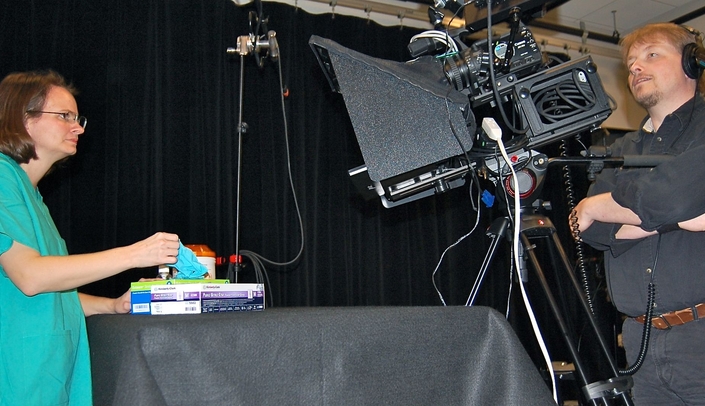How does it feel to help save lives around the world with information that keeps health professionals and others safe when treating patients with the Ebola virus?
For Beth Beam and Stephen Smith of the University of Nebraska Medical Center College of Nursing and the Nebraska Biocontanment Patient Care Unit at Nebraska Medicine, it’s been overwhelming.
Through the College of Nursing HEROES project, the two have guided educational materials on the safe use of personal protective equipment (PPE) for the many types of health care providers needed to care for patients with the Ebola virus.
The information they have produced, which includes procedures for putting on (donning) and removing (doffing) PPE, has been used worldwide and is linked on the Centers for Disease Control and Prevention website.
Their project was funded by a University of Nebraska Programs of Excellence Grant program implemented in 2005 called Healthcare and Emergency Responder Organization Education through Simulation (HEROES).
Beam has received contacts from all over the world. Daily calls and emails come in from health care providers and educational institutions with questions and concerns on PPE and biocontainment procedures.
Notable contacts have included John Hopkins University, Walter Reed National Military Medical Center, and even the Dr. Oz Show.
For Smith, a HEROES instructional technologist, there is no time for reaction – other than to be thinking how the team can present the information better, faster.
HEROES education is a project which educates health professions students and health care providers through simulation online and through mobile training throughout the state for only the cost of travel.
The UNMC College of Nursing in collaboration with the College of Medicine, School of Allied Health Professions, and Center for Preparedness Education, established the interdisciplinary program for emergency preparedness training.
HEROES was spawned as a method of counteracting disasters such as 9-11, anthrax attacks and Hurricane Katrina. Its purpose is to enhance clinical decision making and competencies in emergency preparedness training and public health emergencies.
Connie Miller, Ph.D., interim assistant dean, Omaha Division, is director of the program.
For the past nine years, the team has educated staff at schools and hospitals throughout Nebraska. They taught concepts such as triage, hospital decontamination procedures, and emergency care.
“We knew that our materials made a difference,” Beam said. “But now the need is greater. Our materials help people to put rubber to the road in terms of biological preparedness.”
Beam said the appreciation shown to the HEROES project university-wide and beyond has been staggering.
“We have been able to collaborate with some of the brightest people in this area right here in Nebraska,” Beam said. “Help from both faculty and staff has been so critical. That makes a difference.”
Through world-class research and patient care, UNMC generates breakthroughs that make life better for people throughout Nebraska and beyond. Its education programs train more health professionals than any other institution in the state. Learn more at unmc.edu and follow us on social media.
Twitter | Facebook | Pinterest | YouTube
